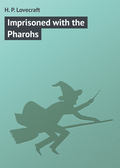
Говард Филлипс Лавкрафт
The Moon Bog
Such were the idle tales which had made the villagers leave Kilderry, and when I heard them I did not wonder that Denys Barry had refused to listen. He had, however, a great interest in antiquities, and proposed to explore the bog thoroughly when it was drained. The white ruins on the islet he had often visited, but though their age was plainly great, and their contour very little like that of most ruins in Ireland, they were too dilapidated to tell the days of their glory. Now the work of drainage was ready to begin, and the laborers from the North were soon to strip the forbidden bog of its green moss and red heather, and kill the tiny shell-paved streamlets and quiet blue pools fringed with rushes.
After Barry had told me these things I was very drowsy, for the travels of the day had been wearying and my host had talked late into the night. A man-servant showed me to my room, which was in a remote tower overlooking the village and the plain at the edge of the bog, and the bog itself; so that I could see from my windows in the moonlight the silent roofs from which the peasants had fled and which now sheltered the laborers from the North, and too, the parish church with its antique spire, and far out across the brooding bog the remote olden ruin on the islet gleaming white and spectral. Just as I dropped to sleep I fancied I heard faint sounds from the distance; sounds that were wild and half musical, and stirred me with a weird excitement which colored my dreams. But when I awaked next morning I felt it had all been a dream, for the visions I had seen were more wonderful than any sound of wild pipes in the night. Influenced by the legends that Barry had related, my mind had in slumber hovered around a stately city in a green valley, where marble streets and statues, villas and temples, carvings and inscriptions, all spoke in certain tones the glory that was Greece. When I told this dream to Barry we had both laughed; but I laughed the louder, because he was perplexed about his laborers from the North. For the sixth time they had all overslept, waking very slowly and dazedly, and acting as if they had not rested, although they were known to have gone early to bed the night before.
That morning and afternoon I wandered alone through the sun-gilded village and talked now and then with idle laborers, for Barry was busy with the final plans for beginning his work of drainage. The laborers were not as happy as they might have been, for most of them seemed uneasy over some dream which they had had, yet which they tried in vain to remember. I told them of my dream, but they were not interested till I spoke of the weird sounds I thought I had heard. Then they looked oddly at me, and said that they seemed to remember weird sounds, too.
In the evening Barry dined with me and announced that he would begin the drainage in two days. I was glad, for although I disliked to see the moss and the heather and the little streams and lakes depart, I had a growing wish to discern the ancient secrets the deep-matted peat might hide. And that night my dreams of piping flutes and marble peristyles came to a sudden and disquieting end; for upon the city in the valley I saw a pestilence descend, and then a frightful avalanche of wooded slopes that covered the dead bodies in the streets and left unburied only the temple of Artemis on the high peak, where the aged moon-priestess Cleis lay cold and silent with a crown of ivory on her silver head.







